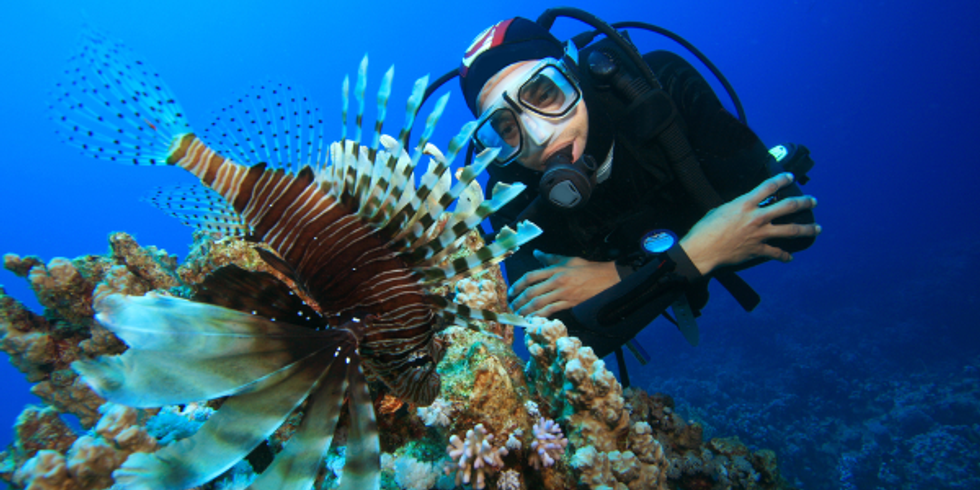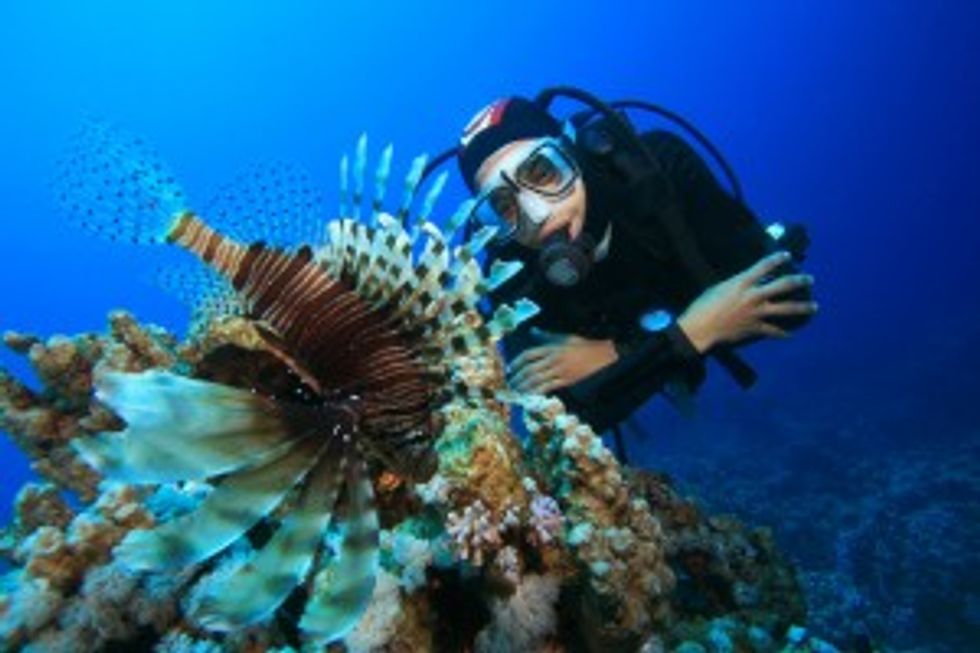

I’m a Marine Biologist and have been working in a Marine Research Center for the past five years. The focus on my work is mainly on corals. It’s been quite a journey—a fun, adventure-filled, and adrenalin-pumping half a decade.
I claim to be 100% biologically male and 50% Brazilian. Not to sound conceited, but I never experienced any form of bullying, racism or the like; neither in childhood nor in work. Thus, I consider myself lucky because some of my childhood friends did.
My work entails a lot of diving sojourns. This is part of my current research project on the health of these important cnidarians. Through the years, there have been reports of coral reef deterioration all over the world. There are a myriad of reasons—human intervention, bleaching and sea urchin grazing. The sad thing about this is most people do not think much about these creatures and merely regard them as colored rocks. And as they are in some way, they are definitely more than just that.
Since corals are abundant in the Pacific, your job could mean a lot of travelling across the world. This means that you need to have a viable passport and diving license. Though a significant part would involve a lot of site exposures, we do spend more than 70% of our jobs in the office or in the laboratory doing analysis. A lot of people think that we’re just sea nomads.
I’ll give 9 out of 10 on the scale of job satisfaction. Not many are privileged to explore the hidden treasures of the ocean. These gems are not the famed treasure chests on sunken ships but are the breathing, thriving organisms therein. To give me a full blast, I’d say a manned exploration at the sea vents or finding a new species of corals in the Pacific—or a bigger funding.
My heart skips a beat upon seeing a colossal colony of corals. Mother Earth built these fortresses for thousands of years; only to be destroyed within seconds by indiscriminate fishing techniques of humans. I believe that defending the fishes’ abode is my champion cause—yes, it has become my vocation over the years. If individuals or groups will not stand for them, then who would?
When you’re a biologist, you’ll realize the world in the whole is breathing. Humans as we are, we tend to think that life on Earth revolves around us. In truth, that is not the case. We are but just points that constitute a whole circle. When the rest of that round shape disappears, so do we. People must realize that in order to appreciate and protect the very world that we live in.
As a child, I grew up in a house near the beach. In each possible occasion, I would strip and jump into the pristine salty pools—and I loved it! My friends and I find leisure in seeing fishes of all sorts and diving deeper and deeper until our lungs would burst. My aunts even branded me as the “Sea Gypsy.”
Thus, it came to no surprise I would take up a course related to water life. Marine Biology came up as the ideal choice for me as I attended community college. It feels somehow my life has been following a predetermined plan. But if I’d have the power of Ctrl+Z, I think I could also consider being a Marine Sport Scientist too.
After a close call with a shark, I became really cautious. I was diving then and lost sight of my buddy. My eyes, caught in the allure of the reef, did not sense the shark lurking around. I could’ve worn some degree of protection. Yeah, that was stupid. Every professional, being knowledgeable, must not let their useless pride take over them. After seeing that familiar streamlined body and that dorsal fin, I acted on all the flight response that I can muster. And thank God—I’m still in one piece!
I learned school doesn’t really prepare you for everything. You may have been stuffed with all the books and theorems during those days, but it doesn’t really equip you with a premeditated response scheme for a demanding boss or an officemate that gets on your nerves the first thing in the morning. Moreover, it seems that the four walled-curriculums did not quite equip me with the practical side of things.
Many people would mistake me for a fisherman, a surf dude, a laboratory technician, etc. Marine Biologists, I believe, are flexible people. We can diversify our fields according to our interest and the research grant.
When I’m working in the lab, I would wake up each morning after a dream spell filled with dancing planktons and towering diatoms – that just means that you’re looking out for another day with the microscope. The job may sound mundane, but it sure becomes bliss when you discover a new species or uncover an interesting trend in your data.
I have to admit that getting a funding is a bit challenging. So, proposals should be thoroughly reviewed, scrutinized and validated to suit the benefactor’s meticulous tastes. Moreover, as there are many people who are also vying for the spot, the competition gets stiffer—the basic ruling of the law of demand and supply. To make things more cumbersome, these contracts are ephemeral so it does not really give you a very stable feeling.
The tension would really escalate during proposal presentations, but that is just a small part of the whole scenario. The bigger picture is really okay. You would find yourself manning a towing expedition or taking a plunge to get samples and manage to analyze them at the lab. The healthy work-life balance can be exhibited when you are able to delineate the two aspects in your life. Having an ample time with your loved-ones is essential. By far, I do not see myself breaking that outline yet.
A PhD holder gets an average of $30,000 annually. This does not include the bucks you get from grants and contracts. So, the salary range actually varies greatly from one person to the other. Honestly, I’d like to work better to upgrade my level next year. But now, since I don’t have a family to support yet, the compensation gets well within my means.
I get several work-related vacations each year—usually in the Pacific Rim. My buddies and I feel privileged to roam the world at our hearts content without sacrificing the quality of our work.
We often hit the waves, too. Huntington Beach is the perfect place for that. When you’ve grown by the sea—it is just amazing how easily you can consider your work as a holiday.
One needs to graduate in Marine Biology or from a related science to work in this field. I suggest that you’d work on your Doctorate first before having a longtime job. To have a trump card at this field, you have to either excel or get the highest possible educational attainment. Of course, it comes as a prerequisite that you must have a Diver’s License. Every Marine field worker must know how to swim and have the necessary training to brave the seas.
Marine Biology is a two-faced job. It’s an elaborate mixture of the methods of science—the laboratory and the field. One cannot survive without the other. Thus, in order to stay at the top, you need to love both areas.
Five years from now, I could see myself diving—exploring the not oft charted seas of the North and South. Diving is indeed in my blood and by then, I want to lead an “expedition” to discover some uncommon albeit new species of marine life in the deep.
JustJobs.com is a job search engine that finds job listings from company career pages, other job boards, newspapers and associations. With one search, they help you find the job with your name on it.
Marine biologist image from Shutterstock

 Bigstock
Bigstock Bigstock
Bigstock Bigstock
Bigstock


